Resource Center
The Transit Workforce Center is pleased to host a curated collection of publications and other materials to assist stakeholders engaged in transit workforce development. The Resource Center includes case studies, training materials, research reports, and other materials of interest, including publications produced by federal government agencies, transit organizations, and independent research entities. Resources may be filtered by topic, resource type, and transit mode. This TWC blog post explains how to use the Resource Center.
We are continuing to update the Resource Center regularly. Please contact us via the Request Help menu option if you would like assistance using the Resource Center or are looking for resources on a particular topic. We also welcome suggestions of topics or specific resources to add.
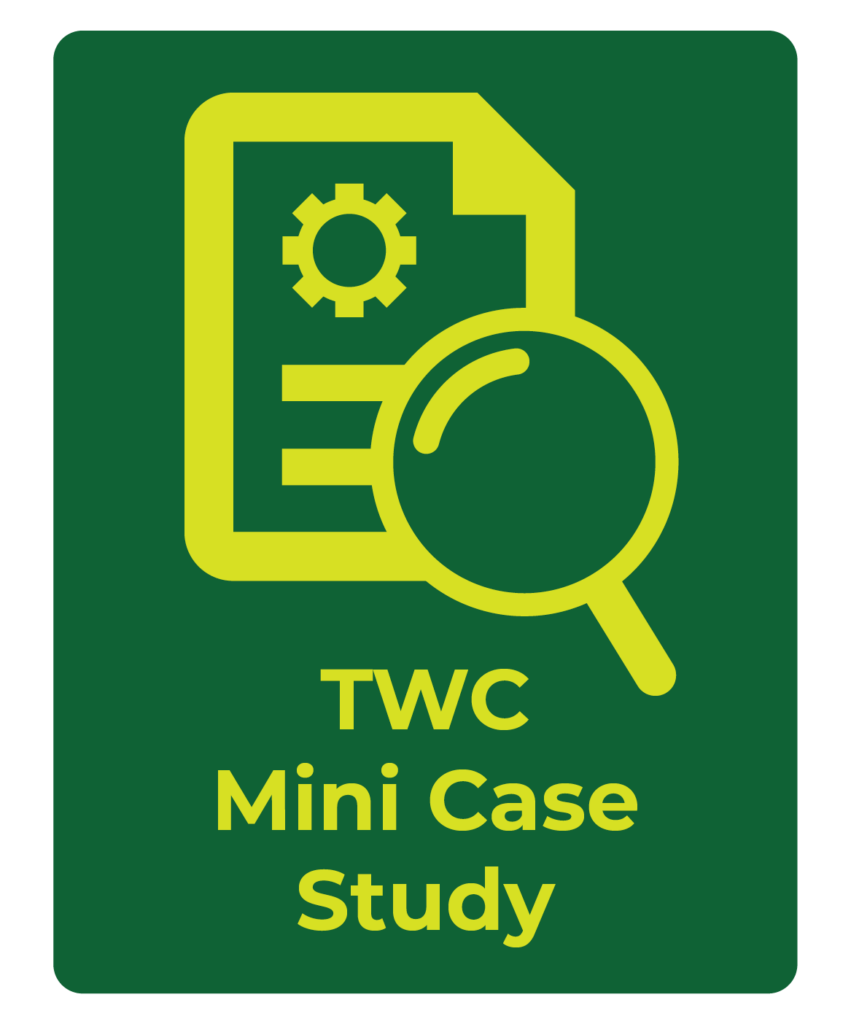
Mini Case Studies: Zero-Emission Bus Workforce Transition
As more funding becomes available for low- and no-emission transit vehicles, more agencies are beginning and continuing their transitions to zero-emission fleets. These mini case studies offer examples of training, procurement, and retention methods being used by agencies at various fleet transition stages.
Transit Workforce Center
August 2024
LEARN MORE
As more funding becomes available for low- and no-emission transit vehicles, more agencies are beginning and continuing their transitions to zero-emission fleets. Well-developed and proactive training and preparation of mechanics and operators is critical to a successful ZEV transition, reinforced by dedicated funding for workforce development through FTA’s low-no grants, which offer 5% for workforce development, as well as through FTA formula funds. These mini case studies offer examples of training, procurement, and retention methods being used by agencies at various fleet transition stages.
- Transferable Knowledge and Train-the-Trainer at IndyGo and ATU Local 1070
- Innovative Technology and Documentation for ZEB Workforce Transitioning at AC Transit and ATU Local 192
- Transitioning Operators Through Pre-Apprenticeship, Apprenticeship, and Mentorship at Golden Gate Transit and ATU Local 1575
- Frontline Worker Involvement in ZEB Transitioning at SporTran and ATU Local 588
- Midwest Hydrogen Center of Excellence at SARTA and AFSCME Local 1880
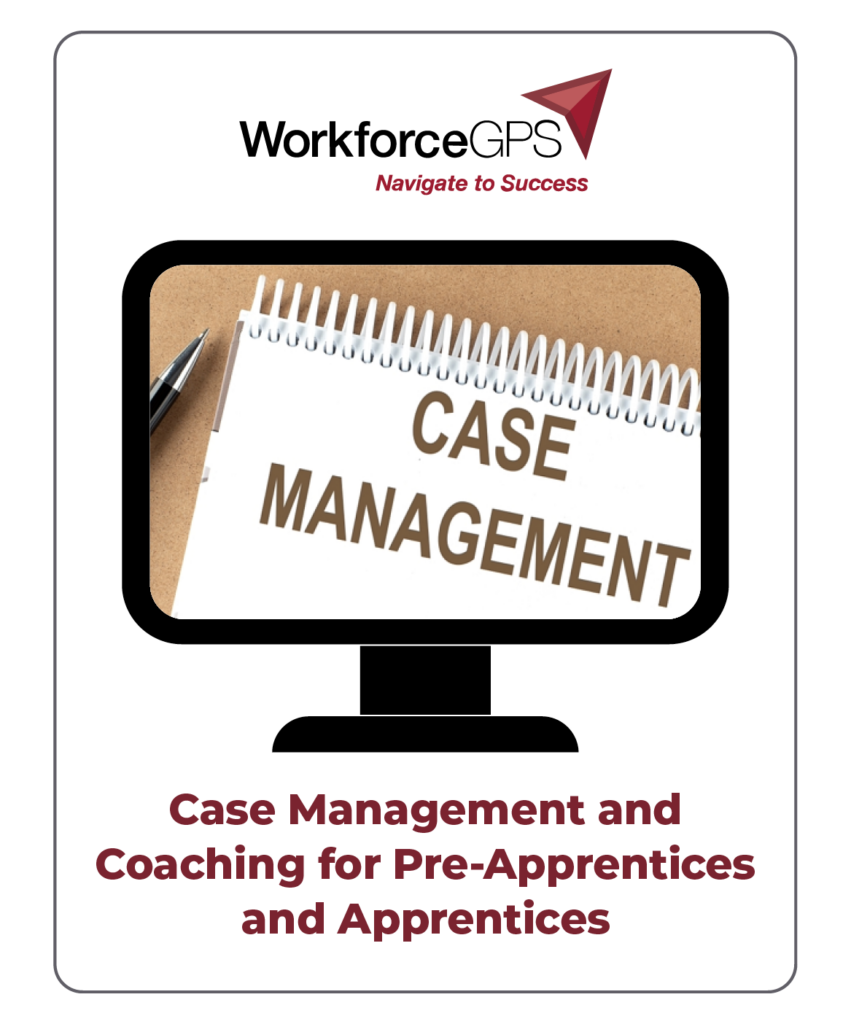
Case Management and Coaching for Pre-Apprentices and Apprentices
Working with pre-apprentices and apprentices requires a combination of case management and coaching. This webinar provides the fundamentals of case management and coaching and teaches a framework for effective service delivery. This session also focuses on the use of assessments for productive service planning, quality program documentation and team communication for successful handoffs.
Workforce GPS
August 2024
LEARN MORE
Working with pre-apprentices and apprentices requires a combination of case management and coaching. This webinar provides the fundamentals of case management and coaching and teaches a framework for effective service delivery. This session also focuses on the use of assessments for productive service planning, quality program documentation and team communication for successful handoffs.
MODERATOR(S)
- Luis Roig, Contracting Officer’s Representative, Office of Apprenticeship, U.S. Department of Labor Employment and Training Administration
PRESENTER(S)
- Amy Landesman, Grantee Coach, ICF
- Valerie Taylor, Grantee Coach, ICF
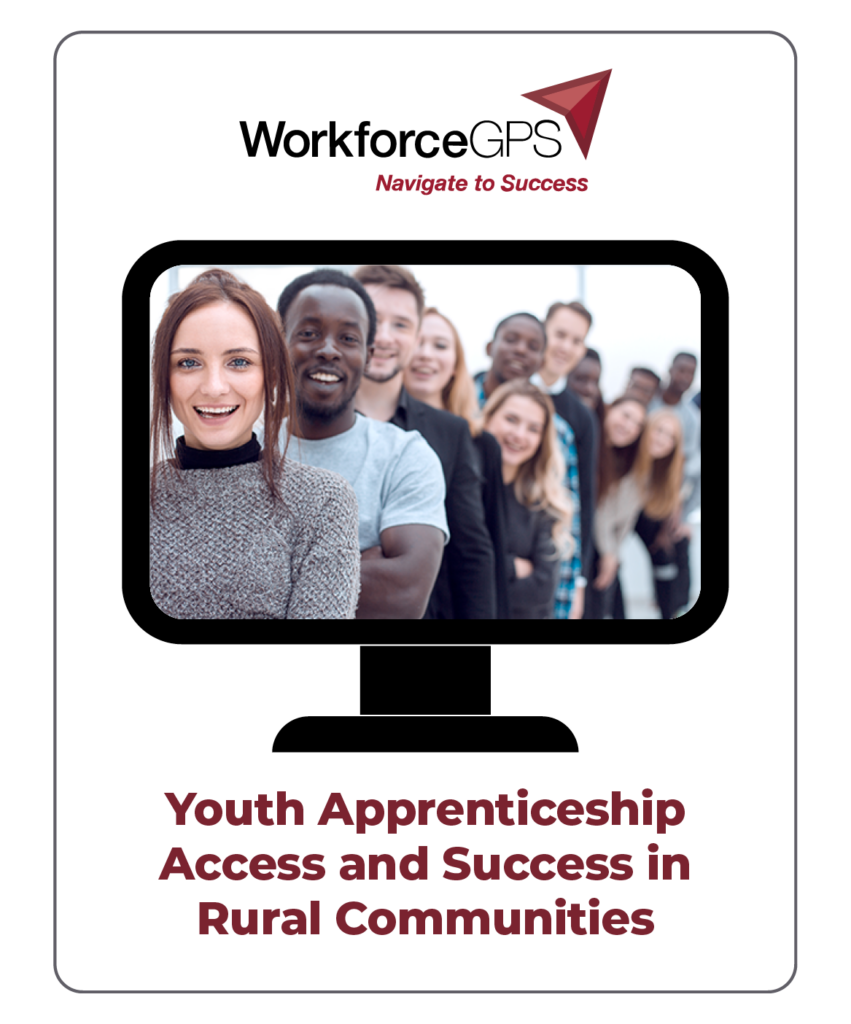
Youth Apprenticeship Access and Success in Rural Communities
In rural communities, widely dispersed populations face a multitude of access challenges. Faced with a declining talent pool, lower educational attainment, and rising poverty rates caused by the Covid-19 pandemic, there is an urgent need to prepare young people in rural areas for high-demand careers.
WorkforceGPS
August 2024
TOPICS: Apprenticeship, Career Pathways, Diversity, Equity, Inclusion, and Access, Mentorship, Retention, Trainer and Mentor Development
In rural communities, widely dispersed populations face a multitude of access challenges. Faced with a declining talent pool, lower educational attainment, and rising poverty rates caused by the Covid-19 pandemic, there is an urgent need to prepare young people in rural areas for high-demand careers.
As part of the Implementing Workforce Programs for Rural Youth series, this webinar, hosted by the Office of Apprenticeship, focused on best practices and creative solutions for increasing pre-apprenticeship and youth apprenticeship access, enrollment, retention, and program completion for young people in rural areas. Featured youth apprenticeship intermediaries and partners shared their accomplishments in developing youth apprenticeship opportunities in rural areas, establishing networks of support, and best utilizing available resources to ensure pre-and youth apprenticeship success.
MODERATOR(S)
- Maisha Meminger, Manpower Analyst , Division of Youth Services, U.S. Department of Labor, Employment and Training Administration
PRESENTER(S)
- Vanessa Bennett, Associate Director, Center for Apprenticeship & Work-Based Learning, Jobs for the Future
- Zach Boren Senior Policy Program Manager, Urban Institute
- Bhavani Arabandi, Senior Research Associate, Urban Institute
- Jacqueline Rayfield, Policy Analyst, Urban Institute
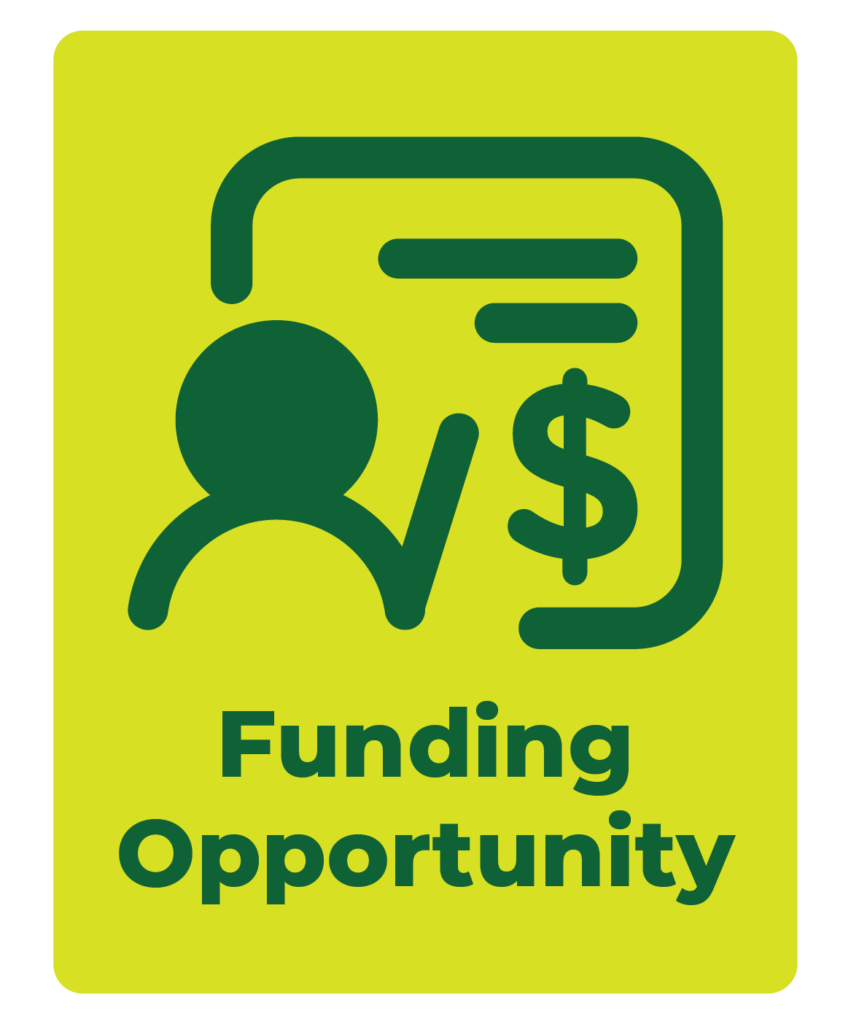
YouthBuild Funding Opportunity
Administering Agency: Employment and Training Administration
Closing Date for Applications: Sep 16, 2024 Applications must be submitted electronically no later than 11:59 pm Eastern Time.
Estimated Total Program Funding: $99,000,000
Geographic Scope: National
TOPICS: Apprenticeship, Career Pathways, Funding Opportunities, Hiring and Recruitment, Mentorship, Trainer and Mentor Development, Training, Workforce Shortage
Administering Agency: Employment and Training Administration
Closing Date for Applications: Sep 16, 2024 Applications must be submitted electronically no later than 11:59 pm Eastern Time.
Estimated Total Program Funding: $99,000,000
Geographic Scope: National
Description: Under this Funding Opportunity Announcement (FOA), DOL will award grants through a competitive process to organizations providing pre-apprenticeship services that support education, occupational skills training, and employment services to opportunity youth, ages 16 to 24, who are performing meaningful work and service to their communities. The YouthBuild program model prepares participants for quality jobs in a variety of careers, in diverse industry sectors, particularly in infrastructure sectors, and includes wrap-around services such as mentoring, trauma-informed care, personal counseling, transportation supports, and employment preparation – all key strategies for addressing violence in communities. YouthBuild applicants must include construction skills training and may include occupational skills training in other in-demand industries. This expansion into additional in-demand industries is the Construction Plus component. Eligible applicants for these grants are public or private non-profit agencies or organizations, including consortia of such agencies or organizations. These organizations include rural, urban, or Native American/Tribal entities that have previously served opportunity youth in a YouthBuild or other similar program. DOL will fund approximately 75 projects across the country. Individual grants will range from $700,000 to $1.5 million and require a 25 percent match from applicants, using sources other than federal funding. This FOA features a matching waiver for Tribal entities and U.S. insular areas which allows these entities to not include a match commitment in their applications. The grant period of performance for this FOA is 40 months, including a four-month planning period and a twelve-month follow-up period.
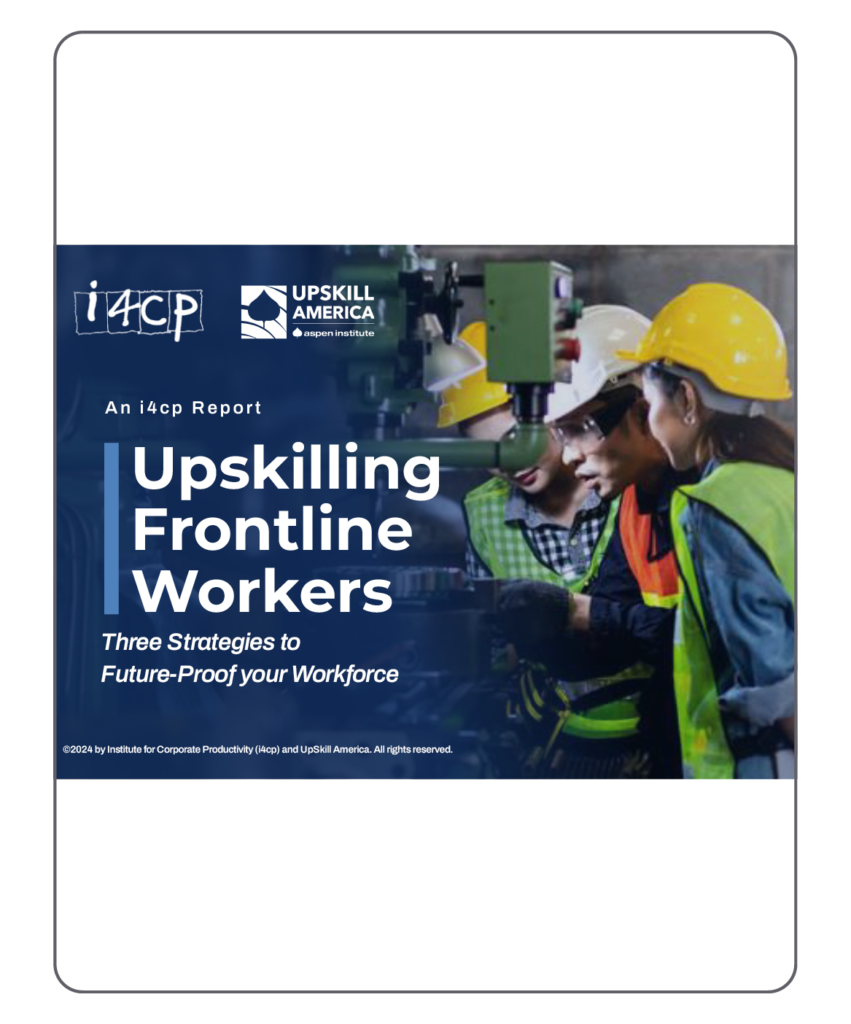
Upskilling Frontline Workers: Three Strategies to Future-Proof your Workforce
This report outlines next practices in upskilling, including internal training, apprenticeship, and tuition assistance that will help your organization to be more productive and resilient for the future.
UpSkill America & Institute for Corporate Productivity (i4cp)
LEARN MORE
The rapid advancement and proliferation of technology increases the need for accelerated and continuous workforce development. Prioritizing the upskilling of frontline workers requires a variety of educational programs, and there is no single answer to the upskilling challenge. Still, UpSkill America and the Institute for Corporate Productivity (i4cp) created this report of best practices that can help any organization become more productive and resilient via a skilled workforce.
Read the brief to learn more about next practices in upskilling, including internal training, apprenticeship, and tuition assistance that will help any organization to be more productive and resilient for the future.
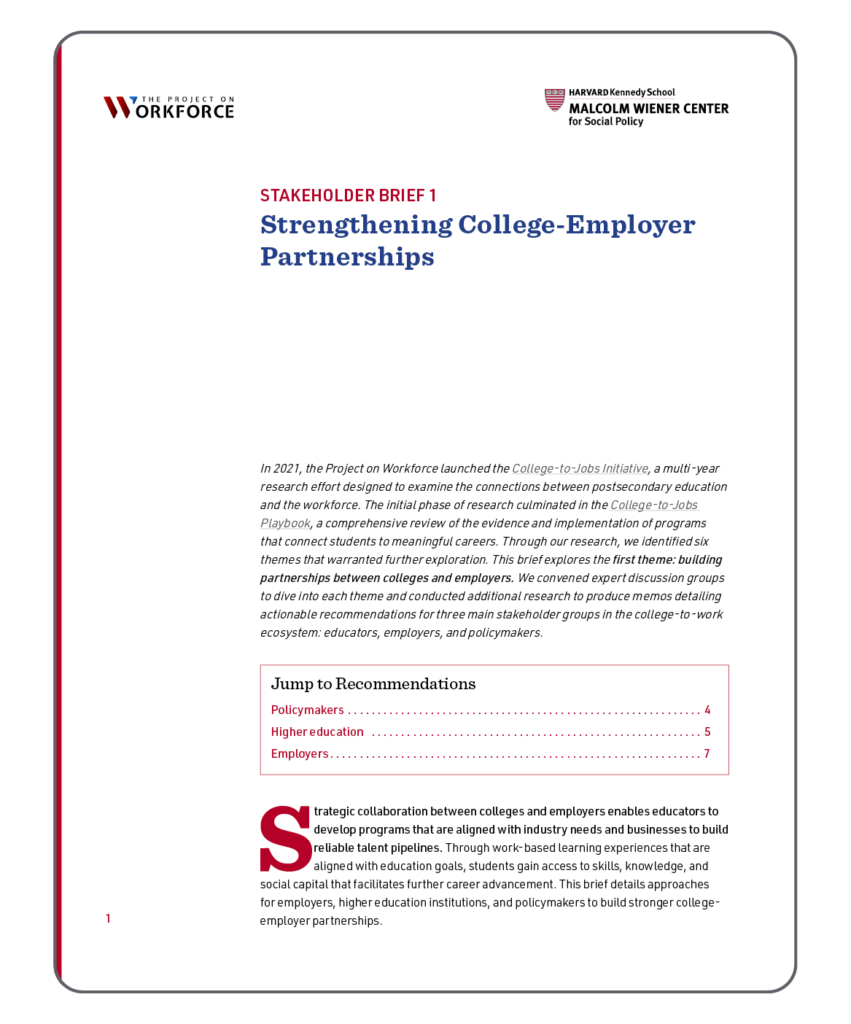
College-to-Jobs Initiative: Policy and Practice Series
With these webinars and stakeholder briefs, the Project on Workforce aims to increase attention and investment in college-to-career transitions and show how colleges can better deliver on economic prosperity.
The Project on Workforce
TOPICS: Apprenticeship, Career Pathways, Hiring and Recruitment, Mentorship, Trainer and Mentor Development, Training
The Project on Workforce released new recommendations for educators, employers, and policymakers on how to improve college-to-jobs connections. With these webinars and stakeholder briefs, they aim to increase attention and investment in college-to-career transitions and show how colleges can better deliver on economic prosperity.
 Stakeholder Brief #1 | Strengthening College-Employer Partnerships
Stakeholder Brief #1 | Strengthening College-Employer Partnerships
 Stakeholder Brief #2 | Expanding Equitable Work-based Learning Opportunities
Stakeholder Brief #2 | Expanding Equitable Work-based Learning Opportunities
 Stakeholder Brief #3 | Redesigning Postsecondary Accountability Measures to Promote Student Success
Stakeholder Brief #3 | Redesigning Postsecondary Accountability Measures to Promote Student Success
 Stakeholder Brief #4 | Driving Regional Economic Development Through Higher Education
Stakeholder Brief #4 | Driving Regional Economic Development Through Higher Education
 Stakeholder Brief #5 | Modernizing and Leveraging Education-Workforce Data Systems
Stakeholder Brief #5 | Modernizing and Leveraging Education-Workforce Data Systems
 Stakeholder Brief #6 | Preparing Students with the Skills to Navigate the Future of Work
Stakeholder Brief #6 | Preparing Students with the Skills to Navigate the Future of Work
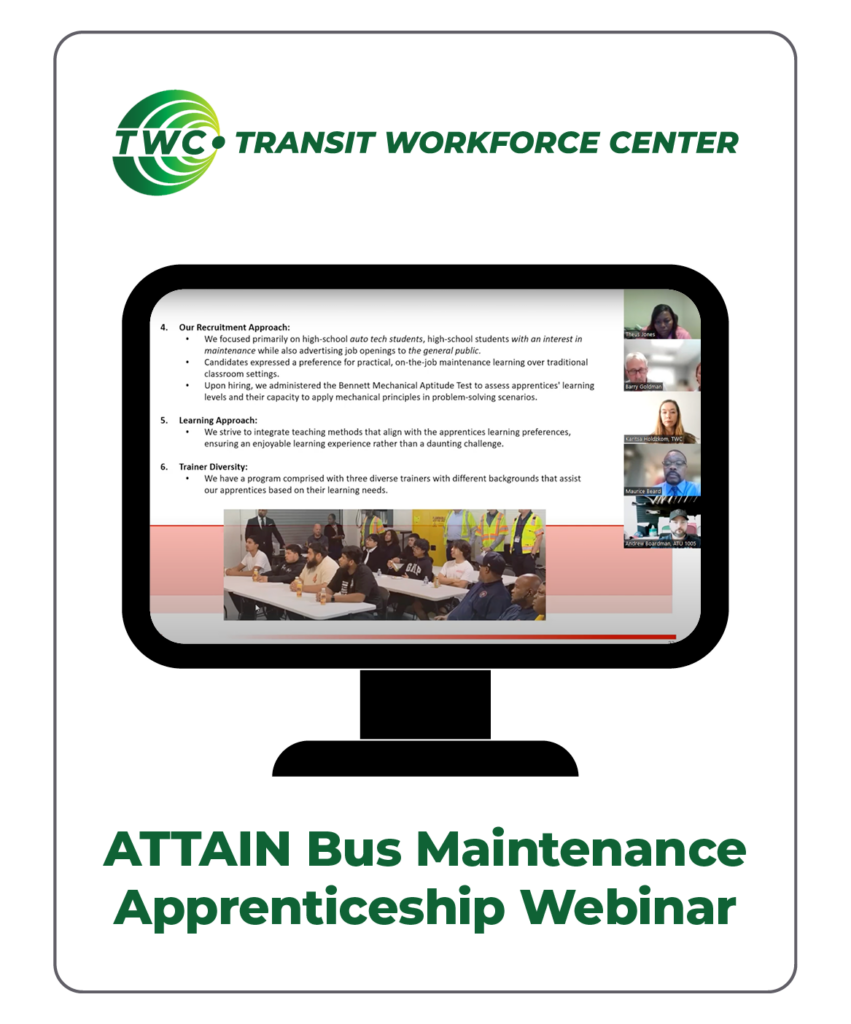
ATTAIN Bus Maintenance Apprenticeship Webinar
This recording of TWC’s American Transit Training and Apprenticeship Innovators Network (ATTAIN) meeting features short presentations and an interactive discussion with Fairfax County Connector/Amalgamated Transit Union (ATU) Local 689 and Metro Transit/ATU Local 1005 on the development and operation of bus maintenance apprenticeship programs.
Transit Workforce Center
June 2024
LEARN MORE
Enjoy this recorded convening of TWC’s American Transit Training and Apprenticeship Innovators Network (ATTAIN) comprised of several engaging presentations that highlight apprenticeship programs across the nation, followed by interactive discussions with Fairfax County Connector/Amalgamated Transit Union (ATU) Local 689 and Metro Transit/ATU Local 1005 on the development of mentorship and apprenticeship programs, how they work, and the benefits they can offer agencies and their workforce.
Below, you can find the link to the full slideshow used in the meeting.
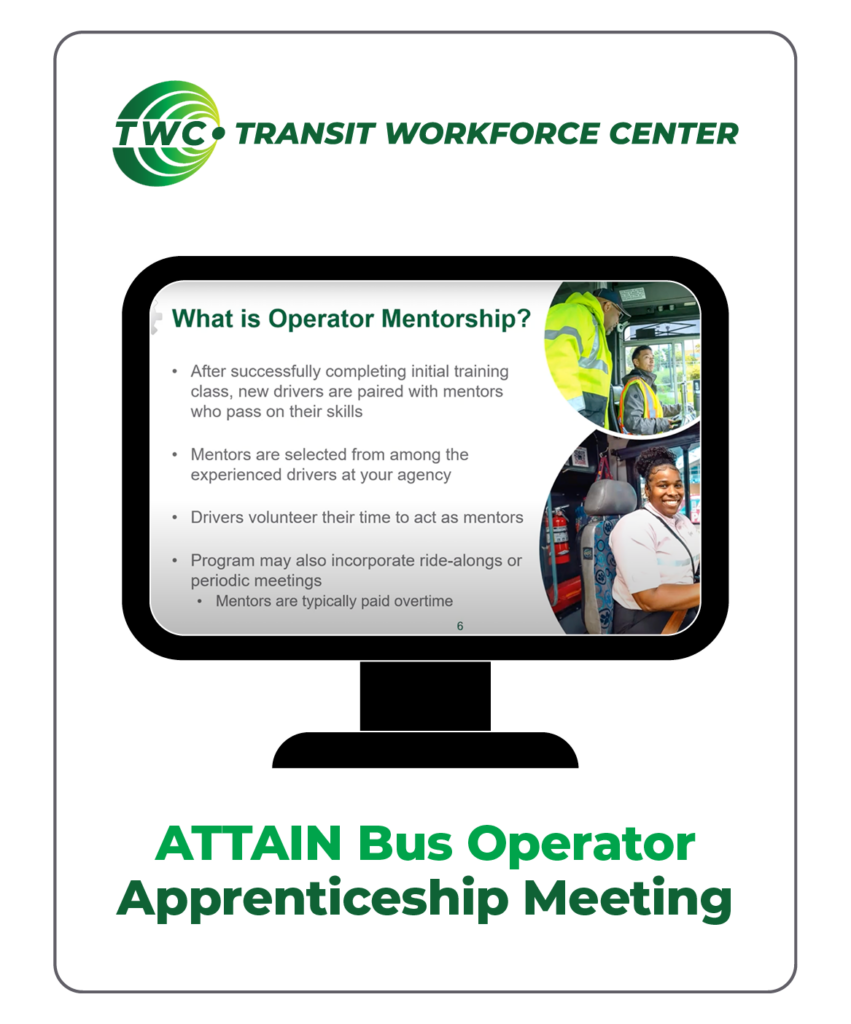
ATTAIN Bus Operator Apprenticeship Meeting
TWC’s American Transit Training and Apprenticeship Innovators Network (ATTAIN) met on May 17, 2024 to discuss bus operator apprenticeship. Check out the recording for short presentations from transit peers across the country and an engaging and interactive discussion about the development of bus operator mentorship and apprenticeship programs, how they work, and the benefits they offer.





 CLEAR
CLEAR
